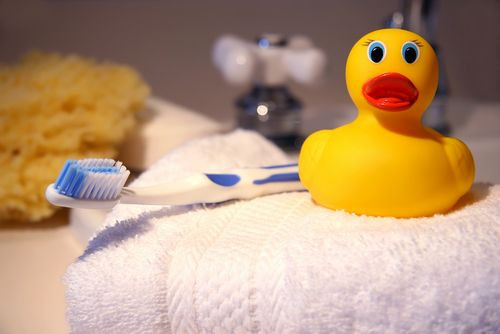PVC Plastics In Household Items Can Kill Your Sex Drive: Phthalates Disrupt Estrogen Levels In Women

The phrase most men dread, “Not tonight, dear. I’ve got a headache,” falls on deaf ears when they want to rustle and tussle in between the sheets. While there are plenty of reasons why women don’t want to have sex, fast food, rubber ducks, and shower curtains could be to blame for a sexless night. A study presented at the American Society for Reproductive Medicine annual conference in Honolulu, Hawaii, found household items with phthalates — chemicals used to make plastics flexible and durable — can actually damage women’s sex drive.
"Phthalates are chemicals in plastics and, basically, they make plastic soft," said Dr. Emily Barrett, lead author of the study of the University of Rochester School of Medicine, in New York, The Telegraph reported. "So if you think of a rubber duck or raincoat or shower curtain being soft and flexible, it’s likely its phthalates that give them that flexibility.”
These chemicals have previously been shown to damage men’s reproductive system. A 2003 study published in the journal Epidemiology found an association between select phthalates and lower sperm count, low sperm motility, and an increased percent of abnormally shaped sperm among a group of men from couples seeking treatment at a fertility clinic in Boston, Mass. These characteristics can affect the likelihood of conception, but they do not mean a man is infertile. Industrial chemicals, including phthalates, have also been associated with reproductive toxicity in laboratory animals.
While phthalates are known to be endocrine disruptors and decrease testosterone levels for men, women, and children, Barrett and her colleagues were interested in whether these chemicals can affect the estrogen level and libidos of women. So, they analyzed the urine of 360 pregnant women to measure the levels of phthalates in their body. The female participants were asked how often they lost interest in sex in the months leading up to their pregnancy.
The findings revealed each of the 360 women showed traces of phthalates in their urine. Those with the highest levels of phthalates were two and a half times as likely to have low libido compared to those with the least. "They are throughout our environment and every single person studied showed measurable levels of these chemicals. So even at the levels found in the environment every day we are seeing an association with interest in sex,” Barrett said about the findings.
Declining hormones, job stress, relationship issues, and other problems have been among the common reasons for low sexual desire in women. However, Barrett’s study could provide an explanation that could lead to new treatments for couples who experience low libido but do not know why. For women who suffer from a loss of libido, there are no obvious reasons why, but the effects of industrial chemicals like phthalates could be responsible for the cause.
Meanwhile, it’s best to avoid phthalates as much as possible. Avoid using PVC plastics and plastics marked with recycling label #3, and steer clear of products that have “added fragrance” on the label. Food is also the leading source of some phthalates. It’s best to avoid fast food when pregnant to prevent chemicals that could potentially harm an unborn baby since phthalates can harm the human placenta. Organic foods are better to consume since phthalates are sometimes used in pesticides.
"Exposure to endocrine disrupting chemicals is difficult to avoid in our society. As we learn more about the effects they have on human health and reproduction, we are realizing that we need to find ways to protect ourselves from them and find alternatives to their use,” said Dr. Rebecca Sokol, president of the American Society for Reproductive Medicine.
Sources: Presentation at the American Society for Reproductive Medicine annual meeting, Honolulu, Hawaii. 2014.
Barr DB, Brock JW, Chenz Z, et al. Phthalate exposure and human semen parameters. Epidemiology. 2003.
Published by Medicaldaily.com



























